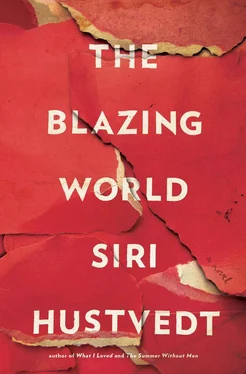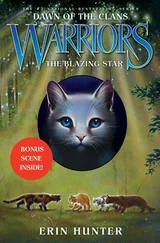Rune leaned forward. His elbows rested on his knees, his chin cupped in his hands — his body tense with concentration. What had he seen? I asked him. I think we were good, he said. We plunged right in. You believe it. It’s so fake, but you believe it.
I told him to run it again without sound.
He did it automatically, which surprised me a little. He seemed to understand. We watched. Without the voices, the film became all masks and movement. I didn’t look at Rune beside me on the sofa, but I felt him. I may have heard him breathing. I don’t know, but he did not stir, and neither did I. The two people on the screen had been changed again. The two had spoken from behind the motionless lips of the masks, but this time we listened to nothing. The static faces appeared to speak because they nodded and lifted their hands, but without words, and I watched the two of them perform a dance that in silence had become alarmingly erotic. Ruina’s gestures had a seductive quality that inflamed Richard’s brutality and the pleasure he took in it.
I felt Richard again, felt his desire to smack the cowering girl silly. Without his pedestrian speeches, my figment seemed to grow in stature. But as the final seconds rolled around again, I wondered who exactly was laughing at the end. Was it Rune or Ruina? I had thought that Rune had burst out of character, that he had broken the fourth wall, but now I wasn’t sure. It seemed to me that she, Ruina, was laughing inside the game, which added another layer of pretense or, at the very least, complicated the imaginary realm. I felt disoriented.
I said to him, Who was laughing?
Rune gave me a puzzled look.
I pressed him. I said again, Who was laughing? You or Ruina? He just stared at me. I spoke to him sharply. I said, Tell me.
He leaned back in the sofa and folded his arms. Are you being Richard now?
No, I said, I’m Harry. I could feel anger tighten my chest and throat.
Tom, Dick, and… he said to me.
I lowered my voice and said I was serious.
He joked and said, “The mask made me do it. The mask made me do it.” Then he accused me of being too serious. I had started it, hadn’t I? Games were meant to be fun. Was I worried about which of us had won, for Christ’s sake? It hadn’t been scripted. What came out of us had come out. Who cared? Where was my sense of humor?
Where was your sense of humor, Harry, that glorious feeling for the ridiculous? Who was that masked man galloping across the television screen? Wasn’t it you? Laugh loudly! Do not turn back now, Harry. You two are partners in the masked dance, and its steps will mean nothing if they are danced alone. Are you not double in the game? Johannes and Cordelia, John and Mary, Richard and Ruina? And why did you drone on about Dora Maar to Rune if you weren’t doubling yourself yet again without even knowing it?
There you were, Harry, on the red sofa beside Rune, telling him about Picasso sighting Maar at a café in Paris, her fingers splayed on the table in front of her as she stabbed the spaces between her fingers with a knife. When she missed, she bled. Five-fingered fillet. Picasso saved her gloves as a trophy.
Picasso painted Maar as the crying woman, as Spain in mourning, but the he-goat loved to make women cry. As the tears tumbled, the goat’s penis stiffened. What a buoyant, energetic little misogynist Picasso was! And you told Rune the whole story, about Maar’s Surrealist photos, the sublime Ubu that won a prize in 1936 among them, and her not-as-wonderful paintings. You told him about how she broke down after Picasso left her, about her analysis with Jacques Lacan, about the hideous chair with steel bars and hairy ropes Picasso wrapped up and sent her as a present and the rusty shovel blade she mailed to him, a game of gifts they played together. And then the package that was found in 1983 among Picasso’s possessions: a signet ring he had designed and engraved with the letters P D, pour Dora . Inside the circlet was a spike.
The man who unwrapped the ring was horrified, but, I said to Rune, it must have been meant as an allusion to Maar’s knife game, don’t you think? To look at the ring is to see a bleeding finger.
No one can play alone, I said. Even when there is no one else in the room, there must be an imaginary other.
I found the quote from Cocteau for Rune: “Picasso is a man and a woman deeply entwined. He is a living ménage. Dora is a living concubine with whom he is unfaithful to himself. From this ménage marvelous monsters are born.”
We are all a ménage, I said to him.
And then Rune said, A long time ago someone told me you were brilliant, just brilliant.
Who? I said, but he couldn’t remember. It was someone who knew me or had known me. It might have been at a party. It’s true, he said. You are.
I was so pleased. Slathered up with the compliment, I felt yielding, pliable, happy. Shine a warm light on poor old Harry and she turns into melted butter.
We were silent then and listened to the ocean. Let’s go down to the beach, I said. And we did. The moon was a crack of light only, a gleaming pale space in the sky briefly uncovered by the thick moving clouds, and we looked up at those cumulus depths with their illuminated grays, and I suppose we saw the same thing, because he whistled. We trotted down to the water and let the surf wash over our feet and felt its drag on our ankles as it withdrew. I felt we were friends.
It was only an hour ago, but in memory I have already changed the view. I find that odd. I am no longer inside myself. I see the two of us from behind, standing on the beach, two tall, dim silhouettes in the compromised moonlight. At some point, we turn and walk up the beach and down the path of gray wooden planks that leads to the house. When he bids me good night, he smiles. He says that it has been a great day, a banal phrase, but that is what we say, don’t we? It’s been a great day.
Then he kissed me lightly on both sides of my face and said good night again.
Sunday, June 10, 2001
Coda:
Tonight I luxuriated in the empty house, ate pasta with heaps of vegetables, read Emily Dickinson. She blazes.
Mine — by the Right of the White Election!
Mine — by the Royal Seal!
Mine — by the Sign in the Scarlet prison—
Bars — cannot conceal!
Rune, on the other hand, is a lowly jingle that has dug a trench in my mind and plays again and again. He lingers as a song of doubt. I see his tanned face at dinner as I listen again to his talk about AI, facile and adolescent, but somehow alive: “Machine and human libido.” I have invented new pictures for him: a towheaded boy with his head in sci-fi novels. I see him build a machine in his backyard. I see him in a darkened movie theater, his eyes lit by the screen as he watches an alien invasion. He must have felt like an alien out there in Iowa with his sister. I see cornfields and red barns. I have never been to Iowa. I am painting by the numbers.
Yesterday — I think it was yesterday — he inscribed a quote in the sand with a shell as we sat on the beach. It was from Marinetti’s “Futurist Manifesto,” 1909: “We are going to be present at the birth of the centaur and we shall soon see the angels fly.” When I told him Marinetti was mad and repulsive, he said he loved the mad and the repulsive. He loved fire, hatred, and speed. There is beauty in violence, he said. No one wants to acknowledge that, but it is true. I looked at his lower arm, brown under the white linen shirt he was wearing, the sleeves rolled to his elbows, a baseball cap on his head. I argued with him. It was a fascist aesthetic, I said, and in order to see beauty in maiming and bloodshed, one had to be far removed from those involved. But Rune has learned that the swift verbal or visual kick will prod strong reactions, which he can then lie back and enjoy. He falls into easy insurrection, the kind for which no one pays a price. But this persona is perfect for my plan. They will sit up and notice.
Читать дальше












